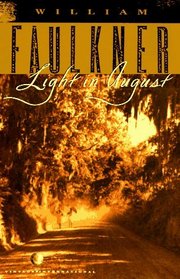Helpful Score: 5
This remains my all-time favorite Faulkner novel. Even the least astute literary critic can appreciate the multiple parallels between the main character and Christ. A reader will understand these characters, as Faulkner goes into their depths, giving feelings, reactions, and background information. One could almost guess how a given character would react in any situation. The language in this book, although still his typical stream-of-consciousness, isnt as difficult to follow as in his other books.
Helpful Score: 3
Light in August, a novel about hopeful perserverance in the face of mortality, features some of Faulkner's most memorable characters: guileless, dauntless Lena Grove, in search of the father of her unborn child; Reverend Gail Hightower, who is plagued by visions of a Confederate horsemen; and Joe Christmas, a desperate, enigmatic drifter consumed by mixed ancestory.
This book was great the first time I read it and even better the second time around! If you haven't read Faulkner you must!
This book was great the first time I read it and even better the second time around! If you haven't read Faulkner you must!
Helpful Score: 3
I always recommend Light in August to people who say that Faulkner is impenetrable. Here the pages flow effortlessly by and the story line is easy to follow. There's none of the interior monologues that so confuse and derail those picking up the southern master for the first time. This plot is more traditional and will be readily appreciated by the average person.
This excellent novel from 1932 is a Great Southern Novel, right up there with All the King's Men. On one hand, the plot and incidents unfold in a readily comprehensible fashion. While there are flashbacks and shifts in narrative voice, they are not as baffling as in TS&TF or As I Lay Dying. This is nearly a stand-alone novel, with few references to other novels in his Yoknapatawpha cycle. As for theme, it's Faulkner's enduring theme, how people endure terrible events. Just like reading TS&TF, even the most hardcore readers have to approach a Faulkner novel as if it were music, getting carried away by the rhythm and flow without trying to understand every note perfectly. In Faulkner's prose there are passages that seem off, that seem only kind of clear or not clear at all. So a reader has to read it twice. Like momma done tole me, nothing good comes easy.
I believe I followed it ... although the connection of all the characters gets confusing at times. I can't wonder that there's deeper concepts than I can precieve on one reading.
Vintage Faulkner...
This was terrible. The language, as well as most of the story, was immoral (murder, prostitution, etc.). The writing, in many places, did not even make sense. It's as if Mr. Faulkner were attempting to write poetry and prose at the same time. (See the first paragraph of chapter six as a prime example.) Finally, the ending was worthless. After rambling through the book (rather than having a definite purpose), Faulkner did not leave the reader with a sense of finality, or even wanting more. He leaves the reader thinking, "Huh?"




![header=[] body=[Get a free book credit right now by joining the club and listing 5 books you have and are willing to share with other members!] Help icon](/images/question.gif?v=90afaeb39)
